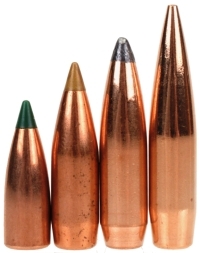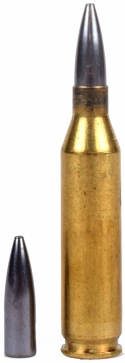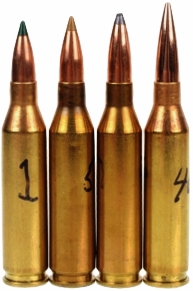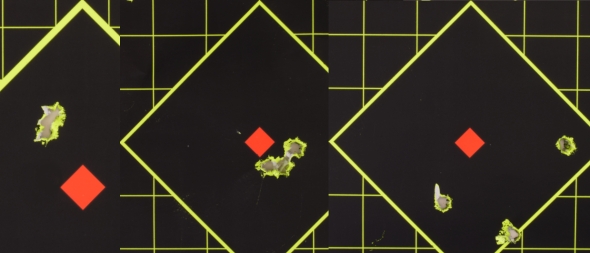
For as much as I appreciate the metallic sights that are included with the rifle, and for as much as they might be used during hunting seasons, nothing beats a scope for assessing and developing and refining handload and rifle performance. To that end, a Leupold VX-3 2.5-8x36MM scope was installed on Warne steel permanent attach rings. The Warne rings key to the rifle receiver’s sides and top, just like the Ruger system rings. It is a light set up with enough power for the application.

As noted in Part I, four bullets were selected that covered everything from varmint to deer hunting and powder was selected with the short 18.5″ barrel as a consideration. Each combination was checked in the rifle with a COL gauge for maximum length, those measurements were adjusted -0.20″ for minimum rifling leade clearance as required. Rounds exceeding SAAMI COL specs were verify to feed through the rifle’s magazine.
| Bullet | Weight Grains |
Length | Max COL |
| Sierra BlitzKing 1502 | 55 | 0.750″ | 2.620 |
| Remington AccuTip 2431 | 75 | 0.938 | 2.670 |
| Berger Varmint 24321 | 80 | 0.915 | 2.665 |
| Speer SPBT 1220 | 100 | 1.060 | 2.700 |
| Berger Hunting VLD 24528 | 105 | 1.230 | 2.800 |
 After the initial photography was completed, an 80 grain Berger Varmint bullet/handload was added, primarily because the combination performed well in the past, and also because I had a quantity already loaded. Pictured, right.
After the initial photography was completed, an 80 grain Berger Varmint bullet/handload was added, primarily because the combination performed well in the past, and also because I had a quantity already loaded. Pictured, right.
Four of the five bullets had been used before in this rifle with excellent results. This time around, the Berger 105 grain VLD was added and a different selection of smokeless powder was tried for all.
The Ruger has a 9″ twist, which is relatively tight in comparison to Winchester rifles with a 10″ twist, Savage rifles with a 9 1/4″ twist, and Remington with a 9 1/8″ twist. Berger recommends an 8″ twist or tighter, because of the exceptional length of the 105 grain VLD bullet. That said, sometimes the best thing to do is to assemble some test rounds, shoot them and objectively measure their performance with a chronograph and rule. The problem of slow bullet rotation instability often doesn’t show up until shooting goes beyond 300 yards, which is outside of the 18 1/2″ barrel rifle’s planned use. Berger bullets are generally very accurate, too good to dismiss without at least making an attempt.

Once fired brass was decapped, cleaned, trimmed and assembled. The 243 Winchester is an easy cartridge to handload, however, some of the Winchester brass ran thick and required outside neck turning to 0.276″. The Ruger has a minimum chamber that easily handles spec handloads and factory ammo, but not ammo that is oversize in the neck or stretched to the limits of headspace. Because there are several firearm’s chambered for the 243 Winchester in the shop, handloads are always full length resized. When loaded for a BLR they small base resized.
Bullet seating depth was arbitrary, a balance between making sure there is adequate bullet engagement and that the ogive begins forward of the case mouth and that the bullet clears the rifling leade. I don’t really subscribe to parking bullets on rifling or exceptionally close. Half a century ago when manufacturers machined barrel throats several thousandths over groove diameter and bullets were tightly supported as the left a cartridge case, seating bullets out may have accounted for some improvements in accuracy. Today, with the close tolerances that are held, half of one thousandth over groove diameter at the throat, it just isn’t necessary. Proof? Sure, super accurate Range Certified Weatherby rifles with some of the longest freebore in the industry shoot just over 1/2 MOA accuracy.
Sharktopus Vs Whalewolf; I love quality cinema…
I like to write late at night, the same time of night most other crimes are committed. I want to do a good job, I want to be articulate, I want to inform… but then my Mom wanted me to attend Annapolis so there is obviously enough disappointment to go around. Writing begins around 11 PM. I put on a quality movie and watch it out of one eye, while typing and looking at my computer screen with the other. It is about the same way I approached homework and study at the two high schools and five colleges I attended… See mother disappointed over Annapolis. Somewhere around 2 AM, I knock off, get some sleep, and start all over again around 8AM. Day work is different than the night shift; business, shop work, live fire data collection, and finding time to put dinner the in the smoker with the hope my wife won’t toss it out. What does this all have to do with the little Ruger rifle and the 243 Winchester? Nothing, I’m just trying to decide what I want to write next. Hey! Look over there! Isn’t that Mark Gurney?
Nothing broke or blew up so, all and all, not a bad day….
 |
Warning: Bullet selections are specific, and loads are not valid with substitutions of different bullets of the same weight. Variations in bullet material and length will alter net case capacity, pressure and velocity results. Primer selection is specific and primer types are not interchangeable. These data represents maximum loads in our firearms and test equipment and may easily be excessive in other applications. All loads should be reduced by 5%, and developed following safe handloading practices as represented in established reloading manuals produced by component manufacturers. Presentation of these loads does not constitute a solicitation for their use, nor a recommendation.
|
|||||||||||||||||||||||||||||||||||||||||||||||||||||||||||||||||||||||||||||||||||||||||||||||||||
|
|
||||||||||||||||||||||||||||||||||||||||||||||||||||||||||||||||||||||||||||||||||||||||||||||||||||
The 243 Winchester is quite a hot rod of a cartridge. The 308 Winchester isn’t a slouch and this is the 308 Winchester necked down to accept a small, light 6mm bullet. The 18.5″ barrel knocks about 2% off the velocity of a 22″ barrel, and nothing of significance from a 20″ barrel. The Speer 100 grain is my deer/hog load, which looks something like this –
| Speer 100 Grain – Point Blank Range 294 Yards | |||||||||
| Yards | 0 | 50 | 100 | 150 | 200 | 250 | 300 | 350 | 400 |
| Velocity – fps | 3008 | 2897 | 2788 | 2682 | 2578 | 2476 | 2377 | 2281 | 2186 |
| Energy – ft.-lbs. | 2009 | 1863 | 1725 | 1596 | 1475 | 1361 | 1255 | 1155 | 1061 |
| Momentum – lbs-sec | 1.33 | 1.28 | 1.23 | 1.19 | 1.14 | 1.10 | 1.05 | 1.01 | 0.97 |
| Path – in. | -1.5 | 1.1 | 2.6 | 3.0 | 2.2 | 0.1 | -3.5 | -8.5 | -15.3 |
For me, with the exception of the 105 grain Berger which was specifically not recommended for a rifle with this twist rate, far left below, neither rifle or handloads need more work for small to medium game hunting, especially inside a couple to three hundred yards. The Berger 105 grain just wouldn’t group, but there are plenty of other shorter 105 grain choices that will.

Generally speaking, the little Ruger is an easy rifle to shoot. Light weight, natural point and modest recoil. While the groups of record were shot from a steady rest, I did have some time to shoot from a standing and prone position and the rifle handled well. Have not made up my mind on a good sling set up. I like shooting slings, but perhaps only a carry sling is needed for the sake of simplicity.
The Ruger action on this rifle is pretty click, loading or ejecting. The trigger is non-adjustable, but it is clean and very light; just a nudge over 3 Lbs. I did some shooting with metallic sights and the rifle is quick to the shoulder and easy tracking a moving target. The safety is in close thumb reach and quiet in operation. I’m glad I own it.
The 243 Winchester and the Short Barrel Rifle Part 1
The 243 Winchester and the Short Barrel Rifle Part 2

Email Notification